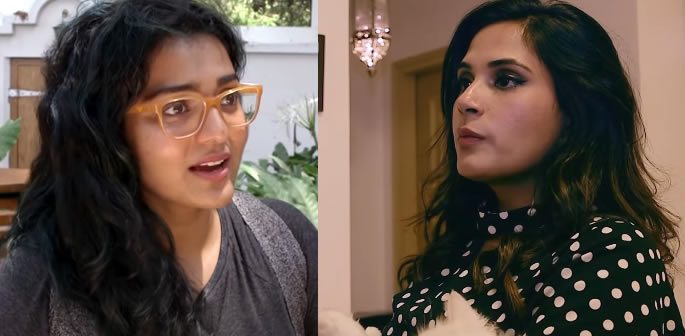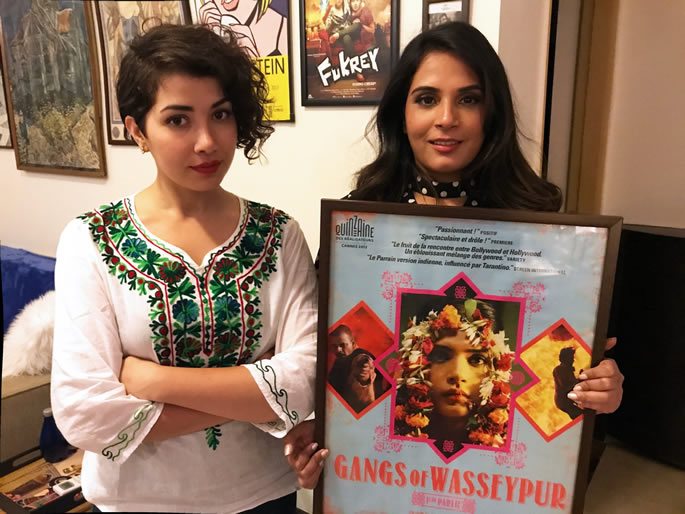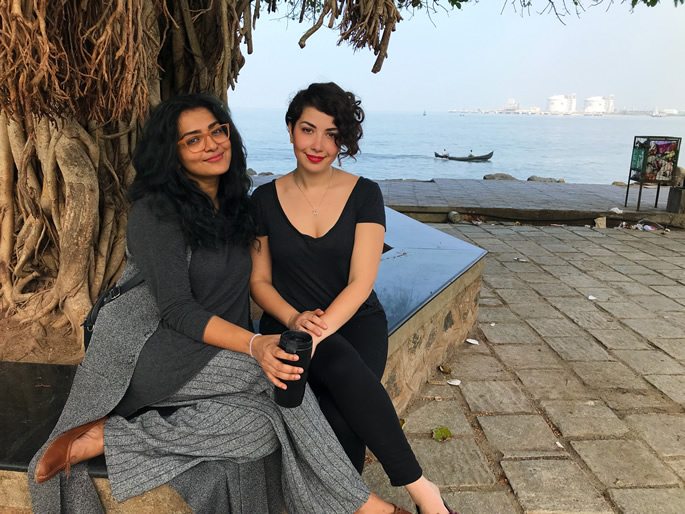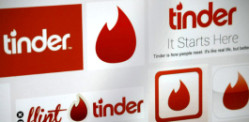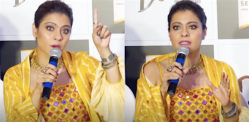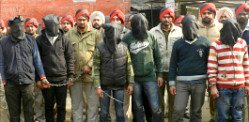“We don’t want your films or you, we want your dead body.”
The continued silence of Bollywood bigwigs on the issue of sexual harassment in Indian cinema has reached deafening levels.
The #MeToo campaign that has swept through Hollywood since the end of 2017 is eagerly circling the Bollywood camp in an attempt to stir its inhabitants. But to no avail.
The ironclad gates of the industry are denying access to any trespasser who might stain its glistening walls. No matter how ethically transparent their intentions might be.
Those brave souls who do attempt to shed light on the industry’s darkest secrets are at risk of being blacklisted. And the actresses who have filed police cases are either being snubbed by casting directors or viciously trolled online.
Such is the discovery made by British-Iranian presenter Sahar Zand in Channel 4’s Unreported World: Bollywood #MeToo.
The 30-minute documentary sees Zand travel to the bright and starry city of Mumbai to speak to those actresses who have experienced sexual harassment in the industry first hand.
On her journey she makes numerous discoveries, not least that sexual harassment is rife all over India.
The perpetrators don’t just lie in the shadows of the world’s most colourful film industry, they can be found on the streets, in offices and public spaces. Where Indian women have the freedom to go as they please, these shadowy predators also wander.
Despite silence and a turning away of the head being common responses to sexual abuse, a number of high-profile stars have spoken out.
Fukrey star, Richa Chadda, for instance, has been openly vocal about the #MeToo campaign. Yet she admits to Zand that the issue lies much deeper – at the heart of the country’s social fabric:
“Most women I know have had unwelcome advances towards them. It’s not just common in the industry, it’s so common in Indian society.”
Sadly, harassment, abuse and sexual violence can be part and parcel of daily life, and, as Zand says, a “rite of passage for the average Indian girl.”
https://twitter.com/Stuart2You/status/997546566247501824
With such obstacles surrounding ordinary women in their daily life, should we even be surprised that things like the casting couch exists in Bollywood?
Zand meets Reena Saini, a 26-year-old theatre actor with the dream of making it into films. Saini has made headlines after alleging that well-known casting director, Sohan Thakur, made unwanted advances towards her and then threatened her after she refused.
Having filed a police report, Reena believes that her decision to speak about her experience could be damaging her career.
As Richa Chadda explains at the beginning of the documentary, the risks of going public are inherently great. Incidentally, they prevent most women from even naming names:
“Fewer people will want to cast them. Definitely. Most definitely. Because they’ll be blacklisted, they’ll be called difficult. She’s difficult to work with, she’s hysterical, she makes an issue, she’s a feminazi.
“When all of these labels start to come up, it gets more and more difficult for women to operate.”
Despite the bold move from Reena to name and shame, she is beginning to buckle under the pressure. She even considers dropping the allegations after she gets some expert advice from two other casting directors, Sangeeta and Tony Bhatia who run Tobah Talent Management.
After they tell her she needs to network more and make herself better known, Reena reveals her harassment incident.
Tony responds:
“In which field doesn’t it happen? You should know as a girl when you are going anywhere when you are doing office job, there also, something can happen to you.”
Sangeeta says: “Out of the whole industry if you’ve had one bad experience, that doesn’t mean the industry is bad.
"If you've had one bad experience, it doesn't mean that the industry is bad".
Erm YES it means that corruption is rife and ONE incident is ONE TOO MANY.
Expose it all.
Call it out.#UnreportedWorld— Emma Adwoa (@Purple_Worship) May 18, 2018
While Sangeeta might have a valid point, the pair’s inconsequential, unsurprised and ultimately blasé response to sexual assault is inherently problematic.
Is harassment so common that in no longer raises eyebrows? Is this simply the price one has to pay for future fame? The subliminal message from this encounter is perfectly clear – either play by the industry’s standards or don’t bother showing up at all.
Notably, Bollywood is not alone when it comes to the issue of sexual harassment. Numerous South Indian actresses have opened up about harassment in their industries, including Kerala-based actress Parvathy.
Known for her iconic roles in films like Ennu Ninte Moideen and Take Off, Parvathy is facing backlash for her criticism of how women are portrayed on screen. Referring to the film Kasaba, which features veteran star Mammootty, Parvathy suggests it is “misogynist” in glorifying anti-women attitudes.
After voicing her opinion in December 2017, she has received vicious gang rape threats as well as death threats from Mammootty’s die-hard fans who tell her:
“We don’t want your films or you, we want your dead body.”
The barrage of hate that many of these actresses face is just the tip of the iceberg. Marginalised by their industry and also by their supposed fans online, many of these women are forced into silence via the fear of physical abuse or worse.
In another disturbing case, a leading South Indian actress has alleged she was abducted and gang-raped by a group of men in February 2017. It was reportedly initiated by Malayalam star, Dileep, who hired the gang to rape the actress as a means of punishment for telling his wife he had an affair.
He allegedly also told them to video the assault so that he could use it as a means of blackmailing the woman into silence.
Shockingly, despite the incredible charges laid against him, Dileep’s fan following has not diminished. When released on bail, he was met with raucous cheers and applause. In comparison, the actress appears to have been left to deal with her “shame” in solitude.
Watch the full documentary here:

The Impenetrable Bubble of Indian Cinema
After viewing the Channel 4 documentary, a few things become startlingly clear.
Firstly, star status equals great power and influence in India. If the reaction to Dileep is anything to go by, the point-blank refusal of fans to acknowledge anything that may tarnish the pristine image of their favourite celebrities is a significant part of the problem.
We only have to consider the decade-long police cases against Bollywood superstar Salman Khan to understand the many exceptions that entertainers face in India. Interestingly, this is also largely reserved for the male stars as opposed to women.
Actresses, in comparison to their male counterparts, are easily-replaceable commodities. Why? Because there is always an eager, younger and prettier woman ready and willing to do more. A point that Reena highlights as she gets ready for an audition:
“They don’t entertain us if we don’t do makeup. Looks first, after, acting.”
In addition, sexual harassment no longer appears to bring the same level of shock to India’s citizens as it once did.
With the nation, and so many other parts of South Asia too, faced with multitudes of rape cases (even of children) on a daily basis, the idea of a woman complaining about simply being harassed because of her sex is almost trivial.
If sexual violence and misogynistic attitudes are so normalised in society, can women ever hope to succeed in achieving justice?
One of the most poignant moments of the documentary happens on the set of MTV India’s Troll Police. The popular and original show puts actresses face to face with their online abusers.
During behind-the-scenes footage, we see top actress Mandira Bedi confront one man who has been trolling her under a fake name. After requesting him to read out his hurtful tweets she asks him to explain himself:
“Say that to me, say married woman is a prostitute. Say it. Why can’t you say it? You can write it because you are behind a fake profile! Be a man, and say it to my face.”
The man is noticeably abashed. And it seems that he finally understands the harmful effects of his online actions. Perhaps he might even be an example for others going ahead, albeit under the showy glamour of an MTV India programme.
Even social media responses to the MTV show have been largely positive:
This #UnreportedWorld about abuse of Bollywood actresses is good. The victims of sexual abuse dupe the trolls into confronting their victims and televise it while they are asked to read out their abusive tweets. They should do that in the West to racist & sexist trolls.
— Amy Wyatt ?? ?? ?? ??? ?? ?? (@Lewisno1fan) May 21, 2018
#unreportedworld showing the darker side of the internet and people. Women using #MeToo or talking about sexual harrassment/assault in India has led to death/rape threats by men. One troll is called out and brought face2face with their victim – he does/says nothing, brilliant.
— Dhilbot v.2009 (@DiabetussDill) May 18, 2018
That was an eye opener. These men are weak and insecure. Need to abuse women to console themselves and their egos. #UnreportedWorld
— Random Hajile @[email protected] (@EliModnar) May 18, 2018
But defeating all trolls and eradicating the abuse women face online this way is nigh impossible. Is it right for women to have to tell their counterparts how they wish to be treated? Shouldn’t respect for each other also be a part of normalised societal behaviour?
While the #MeToo campaign seeing true success in the Indian film industry seems to be a long and wearisome battle ahead, what these actresses are doing is providing a much-needed voice for other women in Indian society.
Particularly, those ordinary citizens who will have faced harassment, abuse and rape and are told to look away.
By high-profile women showing a united front and sharing their own experiences, we can hope that other victims at least no longer feel the need to be silenced by shame.



















































